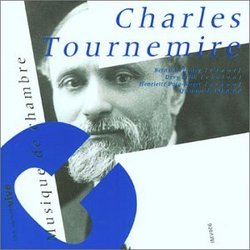| All Artists: Tournemire, Erlih, Plantey, Puig-Roget Title: Chamber Music Members Wishing: 0 Total Copies: 0 Label: Harmonia Mundi USA Release Date: 6/12/2001 Album Type: Import Genres: Pop, Classical Styles: Vocal Pop, Chamber Music, Historical Periods, Classical (c.1770-1830), Instruments, Strings Number of Discs: 1 SwapaCD Credits: 1 UPCs: 713746162221, 3329184680622 |
Search - Tournemire, Erlih, Plantey :: Chamber Music
 | Tournemire, Erlih, Plantey Chamber Music Genres: Pop, Classical
|
Larger Image |
CD Details |
CD ReviewsIncredibly Rare Mystical Art... Sébastien Melmoth | Hôtel d'Alsace, PARIS | 07/27/2007 (5 out of 5 stars) ". Chas. Tournemire (1870-1939)--born in the year of the collapse of the Second Empire, raised in the shadow of the Commune, and died with the Third Republic--is one of the most remarkable of that outstanding set of students of César Franck. Tournemire combined the intense, lush late-Romaticism of Franck with the innovations of Debussy and Ravel--with the additional "Ralliement" sensibility (the resurgence of interest in Romish mysticism in the twilight years of the 19th Century and the early years of the 20th Century)--which resulted in a very esoteric art suggestive of meditation, prayer, and mysticism amid the traditional dichotomy of Christian asceticism versus mundane sensuality. Withal, he was much influenced by Verlaine's poetry: in this case, specifically, Tournemire composed his three substantial piano pieces Poème mystique (1908) upon Verlaine's cycle Bonheur (Happiness) of 1891. (:22mins) The influence is yet more obvious with Tournemire's mélodie-song cycle Sagesse--"poème pour chant et paino" (1908), which is a setting for voice and piano of Verlaine's sonnets from Sagesse (Wisdom) [1880] Selected Poems (Oxford World's Classics) . The song-cycle runs :18mins. Tournemire's string Quartet is also conceived as a poem: the Musique orante of 1933. This seven-section Quartet features old-Church modal tonalities which again reflect Tournemire's preoccupation with Ralliement esthetic. (:16mins) An extremely fine, rare disc: get it if you can. (TT :77mins) ." Acceptable performances of some interesting curiosities G.D. | Norway | 07/09/2009 (3 out of 5 stars) "Tournemire is, despite the general availability of (several of) the symphonies (go for the Naïve versions, not the Marco Polo ones, by the way), still generally regarded as an organ composer, and this is a decent and rare opportunity to acquaint oneself with his chamber music. Tournemire was himself deeply religious, something which seems to have (for good or bad) placed an unmistakable stamp on his music - but like his work in other genres, this is music that doesn't really sound like anyone else's (elements of Franck, Debussy and perhaps Liszt are of course discernible but the music doesn't come across as eclectic); one is sometimes led to muse over the connections to the music of Messiaen, even though nothing here really sounds very much like the latter composer on the surface. The Poeme Mystique was composed in 1908, and is - unsurprisingly - a deeply felt, slow-moving work of genuine distinction but exhibiting little in terms of anything particularly memorable. The Sagesse for tenor and piano stems from the same year and is molded in much the same language and mood (both works are Verlaine-inspired). The Sonate-Poem for violin and piano is engaging, however, with some imaginative, very original and quite effective use of some good musical ideas and the Musique Orante is an engagingly atmospheric and deeply felt work - Tournemire does perhaps, at times, veer dangerously close to the almost self-parodying high-minded seriousness of someone like John Tavener, but does fortunately display much more skill, taste and talent than that latter composer.
The performances seem to be generally rather fine, although I do question some interpretive choices (I would really like to hear some alternative performances before I identify them, though); at least Puig-Roget is consistently incisive in the Poeme mystique, with colorful and finely phrased playing. Plantey struggles a little in the louder parts but has an impressive expressive range and does generally deliver in Sagesse (Puig-Roget is again very satisfying). No serious complaints about Erlib's violin playing either, although I can imagine more variation in color and phrasing; the sound of the violin is also somewhat harsh, which may be due to the dry, close recording. The quartet also unfortunately suffers quite a lot from this, but the sound quality cannot really take all (not even the brunt of) the blame for the rather foursquare-sounding, stiff result. But despite its shortcomings, this is a rather interesting release, recommended to the adventuresome. One would also really like to hear one or more of Tournemire's operas, by the way - any chance for that?" |

 Track Listings (6) - Disc #1
Track Listings (6) - Disc #1